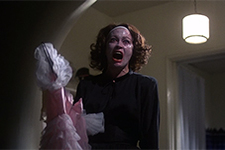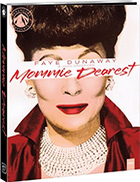Mommie Dearest
|  In 1978, one year after the death of Oscar-winning silver-screen legend Joan Crawford, one of her four adopted children, Christina Crawford, published Mommie Dearest, a tell-all memoir that ended up spending 42 weeks on The New York Times' best-seller list. The book was sensationalistic, painting a portrait of Crawford as an ego-maniacal manic-depressive who abused her children physically and psychologically. Of course, someone took one look at it and thought, This would make a great movie! And it did make a great movie, but not great in the way the producers originally imagined. Mommie Dearest, although intended to be a straight-up dramatic shocker, has, over the years, turned into a much beloved camp classic, with fans who can recite its loopiest moments by heart with the same fervor that animates the most ardent devotees of The Rocky Horror Picture Show (1975). Mommie Dearest is a movie that is so absurdly engrossed with its own depressing subject matter that it forces you to laugh at it in order to maintain some semblance of sanity. It is utterly humorless, which is what makes it so funny. Its lack of any tone other than high-pitched seriousness is its greatest (unintended) joke. Faye Dunaway, who had enormous success throughout the 1970s with roles in a string of commercial and critical hits such as Chinatown (1974) and Network (1976), does not so much play the role of Joan Crawford as she merges into Crawford’s persona. Once in a black wig with painted-on eyebrows and down-turned mouth, the similarities between the two actresses becomes almost uncanny, although Dunaway’s screen presence has an even more monstrous overtone that is underscored by her constant emotional histrionics. The critic for Variety was dead-on when he wrote, “Dunaway does not chew scenery. Dunaway starts neatly at each corner of the set in every scene and swallows it whole, costars and all.” Yet, Dunaway nails the role because she drops all possible inhibitions and plays Crawford in the deliriously perverse way that so many probably imagined her to be. Dunaway plays Crawford as though her screen persona of intimidating toughness and only slightly veiled nastiness that turned into the self-parodic insanity of her later roles in films like Whatever Happened to Baby Jane (1962) and Strait-Jacket (1967) were not performances, but rather an extension of the woman herself. Dunaway brings to life all our most twisted fantasies about the perversity of the rich and powerful, especially an intimidating woman like Joan Crawford who had risen from absolute poverty to become one of the Hollywood elite. She may be rich, but she is also unstable and compulsive, scrubbing away at the floor and telling her maid, “I’m not mad at you, I’m mad at the dirt.” This is one the many reasons why Mommie Dearest is so thoroughly enjoyable on a camp level—it gleefully feeds our worst impulses. The main reason, though, why Mommie Dearest fails so thoroughly as drama is at the narrative level. Director Frank Perry, who had first emerged in 1962 with a sensitive portrayal of troubled teenagers in David and Lisa, put together a script with producer Frank Yablans, which was later polished by Robert Getchell and Tracy Hotchner (a pseudonym for Delia Ephron). Somewhere during the writing process, all semblance of connection between individual scenes was jettisoned, resulting in a movie that plays like a manic-depressive greatest hits compilation. Perhaps this was the intention, to have the narrative structure reflect Crawford’s psychological underpinnings, but it results in a movie that feels disjointed and shallow. Scenes follow one after the other with no real links, which sometimes results in confusion as scenes that actually take place days, months, or even years apart at first appear to take place on the same day. This is one of the reasons why the infamous wire coat-hanger sequence is so deliriously over-the-top. This is the scene in which Crawford, dressed in a robe with her face turned into a hideously demonic mask of white face cream and blood-red lipstick, comes into her young daughter’s bedroom, looks through her closet, and goes absolutely beserk when she finds a dress hanging on a wire coat-hanger. “No ... wire ... coat-hangers ... EVER!” she screams in the movie’s most insatiably quotable line. Then, after throwing all of Christina’s clothes on the floor, she begins to beat her with the coat-hanger, then drags her into the bathroom and makes her scrub the floor, during which she begins to pummel her again, except this time with a can of powdered bathroom cleaner. As it allegedly transpired in real life, this was certainly a moment of complete terror for a young girl; but, as it appears in the movie, it is a moment of supreme lunacy because it is so disconnected from what came before it (Crawford joyfully celebrating after finding out that she won the Oscar for Mildred Pearce) and what comes after it (a chummy scene where the family is interviewed during Christmas for a radio program). What is unfortunate about Mommie Dearest is that it does contain some good scenes that are well-acted and well-directed. The scene in which Crawford’s lover, Steve Forrest (Greg Savitt), finally leaves her after a fight is a moment of great vulnerability that effectively portrays Crawford not just as a monster, but as a woman with deep psychological fissures and vulnerabilities. Dunaway gives a great performance here, as she at first puts on her “Crawford persona” of mixing toughness with unabated sexuality, and when that performance fails, her whole body and face goes limp as she begins to plead with Steve not to leave her alone. It is scenes like this that we get a sense of Crawford’s deep need and her emotional lacking, but Perry never makes any real connection between it and Crawford’s behavior in the rest of the movie. At more than two hours in length, Mommie Dearest is too long, and it begins to sag toward the end, especially after Christina grows up from being a child (played by Mara Hobel) to a teenager and then young adult (both played by Diana Scarwid). The movie insists on taking us all the way to Crawford’s death, pathetic and undignified. It ends in a strange manner, however, that is more condemning of Christina than her mother. After hearing from Crawford’s lawyer that neither Christina nor her brother, Christopher (an almost nonentity in the movie),will get any money from her estate, Christopher says, “That’s Mommie. Always getting the last word,” to which Christina replies, “Does she?” This is the final line of the movie, and it suggests that Christina wrote Mommie Dearest as an act of vengeance, which makes the film an extension of that revenge. Thus, the movie completely fulfills its journey to becoming into its own self-parody, as any pretension of exploring the psychological and emotional depths of child abuse are discarded in favor of pure sensationalism at Crawford’s expense. Christina may be the one who gets hit a lot, but, by the end of Mommie Dearest, it is Joan Crawford’s posthumous image that has taken the biggest blow.
Copyright © 2021 James Kendrick Thoughts? E-mail James Kendrick All images copyright © Paramount Home Entertainment | |||||||||||||||||||||||||||||
Overall Rating: 
 (2)
(2)


